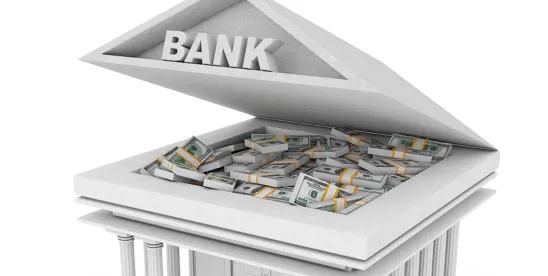Silicon Valley Bank Failure, Receivership and Sale
On March 10, 2023, the California Department of Financial Protection and Innovation closed Silicon Valley Bank, Santa Clara, CA (SVB) and appointed the Federal Deposit Insurance Corporation (FDIC) receiver of SVB. To protect depositors, the FDIC transferred all the deposits and substantially all assets of SVB to Silicon Valley Bridge Bank, National Association (SVBB), a full-service bank operated by the FDIC. On March 26, 2023, the FDIC entered into a purchase and assumption agreement with First-Citizens Bank & Trust Company, Raleigh, NC (FCBT) for the purchase of about $72 billion of SVBB assets at a discount of $16.5 billion. The transaction (i) excludes Cede & Co. deposits and SVBB loans, and (ii) places approximately $90 billion in securities and other assets in the receivership for disposition by the FDIC. In addition, the FDIC received equity appreciation rights in First Citizens BancShares, Inc., common stock with a potential value of up to $500 million.
The FDIC and FCBT also entered into a loss-share transaction on the commercial loans it purchased from SVBB. The FDIC, as receiver, and FCBT will share in the losses and potential recoveries on the loans covered by the loss-share agreement. The loss-share transaction is projected to maximize recoveries on the assets by keeping them in the private sector. The transaction is also expected to minimize disruptions for loan customers. In addition, FCBT will assume all loan-related Qualified Financial Contracts (as defined in 12 CFR § 360.5).
The FDIC estimates the cost of the failure of SVB to its Deposit Insurance Fund to be approximately $20 billion. The exact cost will be determined when the FDIC terminates the receivership. On March 27, 2023, the former 17 branches of SVBB opened as First-Citizens Bank & Trust Company.
Signature Bank Failure, Receivership and Sale
On March 12, 2023, the New York State Department of Financial Services closed Signature Bank, New York, NY and appointed the FDIC as receiver. To protect depositors, the FDIC transferred all the deposits and substantially all assets of Signature Bank to Signature Bridge Bank, National Association (N.A) (SigBB), a full-service bank operated by the FDIC. On March 20, 2023, the FDIC entered into a purchase and assumption agreement for substantially all deposits and certain loan portfolios of SigBB by Flagstar Bank, National Association (N.A.), Hicksville, NY, a wholly owned subsidiary of New York Community Bancorp, Inc., Westbury, NY. As part of this transaction SigBB was placed into receivership.
As of March 20, 2023, the 40 former branches of SigBB began operating under New York Community Bancorp’s Flagstar Bank, N.A. The branches will open during their normal business hours. Customers of SigBB should continue to use their current branch until they receive notice from the assuming institution that full-service banking is available at branches of Flagstar Bank, N.A. Depositors of SigBB, other than cash depositors related to the digital-asset banking businesses, will automatically become depositors of the assuming institution. The FDIC will continue insure all deposits Flagstar Bank, N.A. assumed up to the insurance limit. Flagstar Bank’s bid did not include approximately $4 billion of deposits related to the former Signature Bank’s digital-assets banking business. The FDIC will provide these deposits directly to customers whose accounts are associated with the digital-asset banking businesses. Questions may be directed to (866) 744-5463.
As of Dec. 31, 2022, the former Signature Bank had total deposits of $88.6 billion and total assets of
$110.4 billion. The March 20 transaction included the purchase of about $38.4 billion of SigBB assets, including loans of $12.9 billion purchased at a discount of $2.7 billion. Approximately $60 billion in loans will remain in the receivership for later disposition by the FDIC. In addition, the FDIC received equity appreciation rights in New York Community Bancorp, Inc., common stock with a potential value of up to $300 million.
The FDIC estimates the cost of the failure of Signature Bank to its Deposit Insurance Fund to be approximately $2.5 billion. The exact cost will be determined when the FDIC terminates the receivership.
THESE FAQS WERE LAST UPDATED MARCH 30, 2023.
A. SVBB and SigBB SPECIFIC FAQs
The responses set forth below are based on guidance published by the FDIC for each of these failed institutions and are current as of the date these FAQs were last updated. GT intends to continue monitoring these situations and will update these FAQs as needed to reflect current guidance.
SVBB
-
When was Silicon Valley Bridge Bank, N.A. sold by the FDIC?
On Sunday, March 26, 2023, the FDIC entered into a purchase and assumption agreement for all deposits and loans of Silicon Valley Bridge Bank, N.A., with First-Citizens Bank & Trust Company, Raleigh, NC.
-
What happened to my deposits at SVBB?
According to the FDIC’s published statements, no account holder lost any deposits. Depositors of Silicon Valley Bridge Bank, N.A., will automatically become depositors of First-Citizens Bank & Trust Company.
-
I was an SVBB client, so can I continue using banking services?
Generally, yes; but this should be considered in the context of your particular circumstances. According to the FDIC, during the transition to First-Citizens Bank & Trust Company:
-
Accountholders may continue to use the same checks, which will clear up to the balance in the accountholder’s account;
-
ATM/debit cards will continue to work as usual;
-
the total account balances, including checking, savings, money markets, Certificates of Deposit, and retirement accounts will be available for transactions daily; and
-
customers should continue to use their current SVBB branch until they receive notice from First- Citizens Bank & Trust Company that full-service banking is available at branches of First-Citizens Bank & Trust Company.
That said, the FDIC has yet to provide any specific guidance on credit cards issued by SVBB or money market funds that are settled outside of SVBB.
Direct deposits, e.g., social security, payroll, veterans’ benefits, disability, unemployment, or any payment received electronically, are to continue as usual, as well as autopayments/bill pay/online banking.
Routing numbers and account numbers will remain the same until accountholders are notified in writing by First-Citizens Bank & Trust Company of any changes.
-
Will I receive interest on my Certificates of Deposit (CDs)?
Yes. Interest on deposits accrued through close of business on March 26, 2023, will be paid at the same rate. SVBB’s rates will be reviewed by First-Citizens Bank & Trust Company, the purchasing banks, and CD-holders will be notified in writing of any changes. CD-holders may withdraw funds from any transferred account without early withdrawal penalty until they enter into a new deposit agreement with First-Citizens Bank & Trust Company.
-
What will happen to brokered deposits at SVBB?
Brokered deposits have been assumed by First-Citizens Bank & Trust Company, with the exception of Cede & Co. deposits. If you are a customer who has an SVBB deposit through a broker, you must contact your broker with any questions.
-
Are overdrafts or the use of line of credit allowed?
All lines of credit have been transferred to First-Citizens Bank & Trust Company. Please contact First- Citizens Bank & Trust Company if you have additional questions regarding your accounts.
-
Should I continue to make loan payments?
You need to consider this in the context of your particular situation. However, the FDIC recommends that you continue to make your payments according to the terms of your loan. You may continue to send your SVBB loan payments to the same payment address with checks made payable to “Silicon Valley Bank.” Borrowers will receive a letter advising of any changes.
-
Can portions of uninsured or insured deposits held at SVBB be used to setoff or repay a loan?
It is unclear whether the FDIC will allow such setoffs. In the past, the FDIC has allowed borrowers to offset their uninsured amount against a loan in the same name as the uninsured deposit account.
Initially, on March 10, 2023, the FDIC indicated it would employ the same practices with respect to loans held by SVBB. However, as of the date of these FAQs, the FDIC has changed its guidance and now encourages borrowers with loans held at SVBB to contact an FDIC Loan Representative at:
-
Email at FDIC_Loans@fdic.gov
-
FDIC.gov or the support center link.
-
Will my escrow payments be made?
All services previously performed related to an SVBB loan are to continue. If a borrower receives a notification that any portion of his/her taxes or insurance was not paid, they must notify the First- Citizens Bank & Trust Company immediately. As of the date of these FAQs, the FDIC has not published additional specific guidance on SVBB escrow payments; therefore, customers should consult their counsel and other advisors as needed to understand what is likely to occur and what they should do in their situations.
-
If SVBB owes me money, how do I file a claim?
SVBB creditors must submit claims in writing, together with proof of the claim. To access the FDIC Claims Portal online, go to the FDIC Claims Portal. To file a claim via mail, please send it to the following address: FDIC as Receiver for Silicon Valley Bank 600 N. Pearl Street, Suite 700 Dallas, Texas 75201 Attention: Claims Agent
-
Should I be worried about scams?
Yes. You will not receive any communication from the FDIC requesting any private information; so, beware and wary of any contact to you requesting such information, even if apparently in the name of an official entity or person. Exercise caution if individuals or entities contact you, stating they are acting on behalf of SVBB, Silicon Valley Bank, N.A., or the FDIC, especially if they are seeking personal or private information or asking or advising you to transfer or otherwise handle funds and other assets as they direct.
SigBB
-
When was Signature Bridge Bank, N.A. sold by the FDIC?
On Monday, March 20, 2023, the FDIC entered into a purchase and assumption agreement for substantially all deposits and certain loan portfolios of Signature Bridge Bank, N.A., with Flagstar Bank, National Association, Hicksville, New York, a wholly owned subsidiary of New York Community Bancorp, Inc., Westbury, New York.
-
What happened to my deposits at SigBB?
According to the FDIC’s published statements, no account holder lost any deposits. Depositors of Signature Bridge Bank, N.A., will automatically become depositors of Flagstar Bank, N.A.
-
I was an SigBB client, so can I continue using banking services?
Generally, yes; but this should be considered in the context of your particular circumstances. According to the FDIC, during the transition to Flagstar Bank, N.A.:
-
Accountholders may continue to use the same checks, which will clear up to the balance in the accountholder’s account;
-
ATM/debit cards will continue to work as usual;
-
the total account balances, including checking, savings, money markets, Certificates of Deposit, and retirement accounts will be available for transactions daily; and
-
customers should continue to use their current SigBB branch until they receive notice from Flagstar Bank, N.A. that full-service banking is available at branches of Flagstar Bank, N.A.
That said, the FDIC has yet to provide any specific guidance on credit cards issued by SigBB or money market funds that are settled outside of SigBB.
Direct deposits, e.g., social security, payroll, veterans’ benefits, disability, unemployment, or any payment received electronically are to continue as usual, as well as autopayments/bill pay/online banking.
Routing numbers and account numbers will remain the same until accountholders are notified in writing by Flagstar Bank, N.A. of any changes.
-
Will I receive interest on my Certificates of Deposit (CDs)?
Yes. Interest on deposits accrued through close of business on March 20, 2023, will be paid at the same rate. SigBB’s rates will be reviewed by Flagstar Bank, N.A., the purchasing bank, and CD- holders will be notified in writing of any changes. CD-holders may withdraw funds from any transferred account without early withdrawal penalty until they enter into a new deposit agreement with Flagstar Bank, N.A.
-
What will happen to brokered deposits at SigBB?
Brokered deposits have been assumed by Flagstar Bank, N.A. If you are a customer who has a SigBB deposit through a broker, you must contact your broker with any questions.
-
Are overdrafts or the use of line of credit allowed?
All lines of credit have been transferred to Flagstar Bank, N.A. Please contact Flagstar Bank if you have additional questions regarding your accounts.
-
Should I continue to make loan payments?
You need to consider this in the context of your particular situation. However, the FDIC recommends that you continue to make your payments according to the terms of your loan. You may continue to send your SigBB loan payments to the same payment address with checks made payable to “Signature Bank.” Borrowers will receive a letter advising of any changes.
-
Can portions of uninsured or insured deposits held at SigBB be used to setoff or repay a Loan?
It is unclear whether the FDIC will allow such setoffs. In the past, the FDIC has allowed borrowers to offset their uninsured amount against a loan in the same name as the uninsured deposit account. As of the date of these FAQs, the FDIC has not issued specific guidance on setoffs and encourages borrowers with loans held at SigBB to contact an FDIC Loan Representative:
- Email at FDIC_Loans@fdic.gov.
- FDIC.gov or the support center link.
-
Will my escrow payments be made?
All services previously performed related to an SigBB loan are to continue. If a borrower receives a notification that any portion of his/her taxes or insurance was not paid, they must notify the Flagstar Bank, N.A. immediately. As of the date of these FAQs, the FDIC has not published additional specific guidance on SigBB escrow payments; therefore, customers should consult their counsel and other advisors as needed to understand what is likely to occur and what they should do in their situations.
-
What if SigBB owes me money, how do I file a claim?
SigBB creditors must submit claims in writing, together with proof of the claim. To access the FDIC Claims Portal online, go to the FDIC Claims Portal. To file a claim via mail, please send it to the following address:
FDIC as Receiver for Signature Bridge Bank, N.A. 600 N. Pearl Street, Suite 700 Dallas, Texas 75201 Attention: Claims Agent
-
Should I be worried about scams?
Yes. You will not receive any communication from the FDIC requesting any private information; so, beware and be wary of any contact to you requesting such information, even if apparently in the name of an official entity or person. Exercise caution if individuals or entities contact you, stating they are acting on behalf of SigBB, Silicon Valley Bank, N.A., or the FDIC, especially if they are seeking personal or private information or asking or advising you to transfer or otherwise handle funds and other assets as they direct.







 />i
/>i

